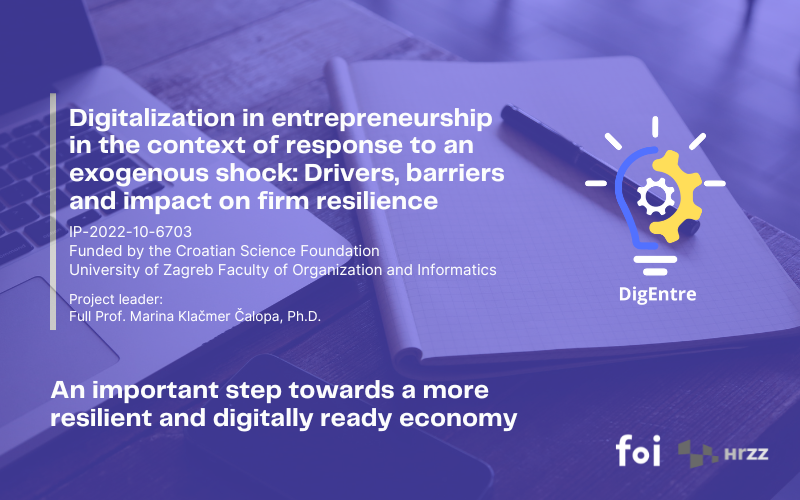DigEntre project - an important step towards a more resilient and digitally ready economy
The project is led by Prof. Marina Klačmer Čalopa, Ph. D. from UNIZG FOI with the support of team members from UNIZG FOI, the Faculty of Economics in Zagreb, the Faculty of Economics in Rijeka and the Faculty of Economics in Split.
During this year, in-depth qualitative work on understanding the experiences of entrepreneurs in crisis situations continued. The phenomenological approach – through unstructured interviews – has already included 25 entrepreneurs from different regions of Croatia (Central Croatia, Istria, Primorje and Osijek-Baranja County), while interviews in Zadar and Šibenik-Knin County are planned for the next period. This research not only reveals the authentic experiences and attitudes of entrepreneurs but also provides valuable insight into their perception of digital solutions as a key response to the crisis.
To build a robust empirical framework, the preparation of a comprehensive survey research that will identify key obstacles and incentives in the process of digitalization of SMEs has been started. The relevant scientific literature has already been analyzed, which laid the foundations for the design of a research model and a validated questionnaire that will serve as a valuable tool for further analysis and recommendations.
The quantitative segment of the project includes the analysis of financial indicators of vulnerability and resilience, for the purpose of which a database of small and medium-sized enterprises was prepared in the period from 2008 to 2023 in three key sectors of the Croatian economy - processing industry, trade and tourism.
In this context, the first paper identified (in)equalities in direct indicators of vulnerability or resilience, i.e. investment and financing strategies, as well as in indirect indicators of vulnerability or resilience, i.e. security and profitability of companies in the dairy and cheese production sector in the Republic of Croatia in the period before, during and after the COVID-19 crisis, as an important activity of the processing, more precisely, food industry.
The second paper analyzed the impact of vulnerability or resilience indicators (liquidity, profitability, growth, indebtedness and asset structure) on investment decisions and capital structure in the three previously mentioned important sectors of the Croatian economy. The latter covered a long period of time – from 2008 to 2023 – which includes the global financial crisis, post-crisis recovery, COVID-19 pandemic and the post-pandemic period. This comprehensive approach makes this research unique in the domestic context.
Already, at a relatively early stage of implementation, the project is generating valuable insights into the factors of successful digital transformation. Identified elements such as technological readiness, organizational culture, regulatory framework and availability of funding sources clearly indicate that a successful digital transition must be strategically managed and systematically supported. The recommendations arising from the project are in line with the objectives of the EU Digital Compass (2021), especially those related to digital skills, infrastructure and support for SMEs.
Why is this important? This project not only conducts scientific research but also concretely contributes to the development of policies and measures that help Croatian entrepreneurs to become more resilient, agile and competitive in the challenges of the future. The project already clearly confirms that digital transformation is not a luxury, but a necessity - and that in this process Croatia has the knowledge, will and resources to implement changes.
